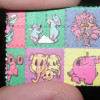Ants befriend snakes to fight foes
Interview with
Nature is full of surprises, and this week’s no exception. Scientists working in Madagascar have discovered an ant species that can tell snakes apart, and work with friends to fight off foes. York University’s Eleanor Drinkwater, wasn’t involved in the study, but took Phil Sansom through the findings...
Eleanor - This study seems to show that ants can tell the difference between different snakes. As far as I know, this could be the first study showing that ants react differently to different vertebrate predators.
Phil - Really? This isn't something that we knew ants could do before?
Eleanor - We know the ants can distinguish between different predators. There's some evidence in American ants that when they are confronted by another species of ant, who is intent on stealing or eating their brood, they can evacuate their nest. But applying this to vertebrates is something that's quite novel and exciting.
Phil - What vertebrates are we talking about here?
Eleanor - The species that this study focuses on is a Madagascan ant and in its range there are two different snakes which it has an interesting relationship with. The first of these is a blind snake, known as Mocquard's worm snake which is specialised in eating termites and ant brood. Then the other one is a Malagasy cat-eye snake which is known as the “ant mother”, which I think is lovely.
The reason for this is because it's often found around the nests of this particular species of ant. Interestingly, it's not hunting the ants but instead it eat these are blind snakes who prey on the ants. The researchers set out to try and work out whether or not the ants distinguish between these two different species.
Phil - How do you do that?
Eleanor - What they did is, first of all, found a whole bunch of these different colonies in the wild which is no easy feat in itself. And then what they did is they presented, for five minutes each, first of all the predatory blind snake, then the cat-eyed snake, then a control snake which is a frog eating snake.
Phil - And when you say presented, they were literally holding the snakes in front of the nest?
Eleanor - Yes, apparently that's exactly what they did. I hope they didn’t get too bitten…
The ants completely ignored the Malagasy cat-eye snake and attacked the predatory blind snake as well as the control snake. But the really interesting thing was specifically and only with the blind snake the answer ran back inside and then they had this amazing evacuation of all of the brood.
Phil - Woah...
Eleanor - That's really really exciting. So not only does that show this predator specific response to this blind snake but also the fact that they ignored the cat-eye snake. At this stage it's kind of unclear whether or not there's this amazing symbiotic relationship going on, where the ants allow this snake to live with them and then the snake will protect them. Or it could be the case that the snake is tricking them with chemical cues in order to sneak into these ants’ nest.
They suggest in the paper that the nests provide them with constant humidity and a constant temperature and a really good habitat for this snake to live. Whether or not they are ungrateful houseguests, or whether or not they are actually helping the ants to defend their nest as well, that's kind of unclear.
Phil - Now how do they tell the difference between the two snakes?
Eleanor - They don't go into it in this paper, and it would be really interesting to see some proper research on this, but ants are known to recognise other individuals largely through olfactory cues, so largely through smells. They can even recognize that an individual is from a separate colony, it might be the same species but it's from a separate colony.
Phil - And then also is it surprising? I know ants are complicated and have crazy societies but is it surprising that they have this level of sophistication?
Eleanor - By the stage I'm unsurprised by anything that ants can do. They have this incredible ability to do all manner of things; you have demonstration of teaching in ants. you have demonstration of “tool use” in ants and many other amazing complex abilities. It's one of these papers when you read something like “man, I wish I'd done that. That's really cool!”
Phil - I got to dangle snakes in front of ants’ nest.
Eleanor - I know right!







Comments
Add a comment